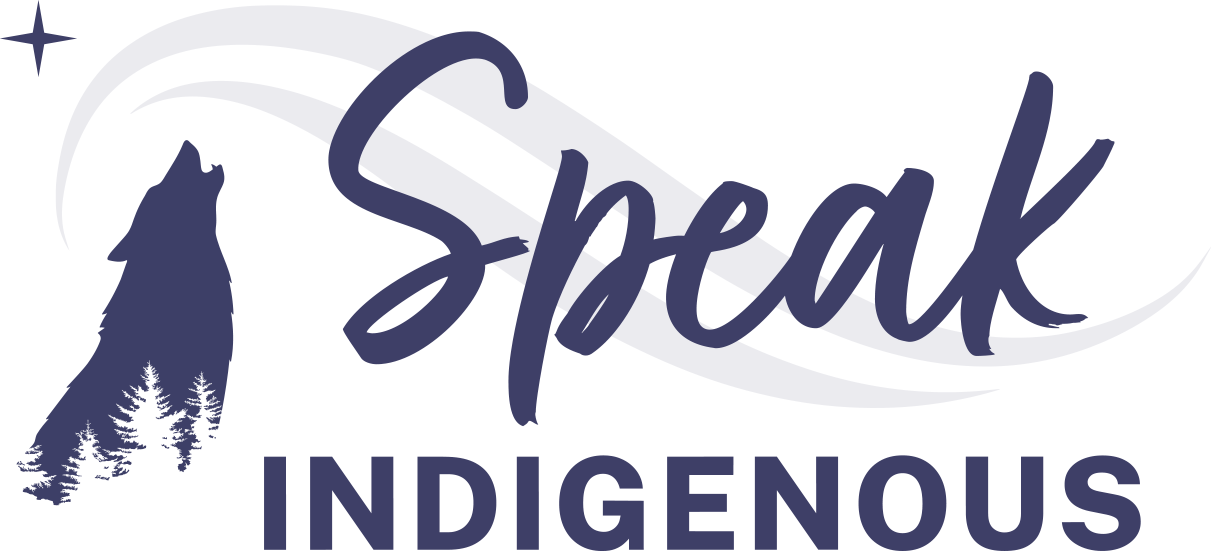Philosophy
“[Some] people are scared to make a mistake or fear being laughed at. I just encourage people: don’t worry about it, keep trying, keep trying. I start off any conversation with the language to promote safety and to recognize and honour the language”
- Tanya Dawn McDougall
Create a Safe Space
For many Indigenous peoples, their languages are deeply connected to their ancestors and their identity. The first thing taken from Indigenous peoples by colonial forces was their language, as it was recognized that language held the key to their sense of self. Speak Indigenous symbolizes resilience and survival, reflecting the ongoing journey of self-discovery for many Indigenous people today as they work to reconnect with their roots.
Creating safe spaces for Indigenous languages is essential to reversing the damage caused by colonialism, which imposed shame on Indigenous peoples and their languages. This shame was not inherent to Indigenous cultures; it was something forced upon them. Safe spaces allow Indigenous peoples—regardless of their language proficiency—to feel accepted, empowered, and free to grow, express themselves, and embrace their identity. These spaces affirm the value of Indigenous languages and identities, underscoring that they are worthy of respect.

For generations, Indigenous peoples have endured attempts to silence their voices and erase their cultures. Despite these efforts, they have survived, and they are still here today. When institutions and organizations embrace Speak Indigenous and declare themselves safe spaces, they send a powerful message: Indigenous languages and identities are valued.
Speak Indigenous extends an open invitation to anyone on their language journey, whether they are just beginning to learn or are already proficient. These safe spaces provide the freedom to practice, develop, and embrace their language without fear of judgment. Indigenous languages, like the sacred language of the wolf—gifted by the Creator—are an enduring spirit that has survived through centuries of adversity. Just as the wolf’s calls echo in the world, Indigenous voices will continue to be heard through the creation of these safe spaces.
The Speak Indigenous Logo
For the Indigenous Languages Campaign, the wolf came forward through prayer and consultation to be the totem spirit. The wolf is known to be a master communicator. Just as language for humans is complex and multi-faceted, so it is for wolves. The wolf’s howl for example can be heard across great distances and is believed to extend and carry through into the spiritual realm.
This power of the use of language is what conveys the hopes for this campaign wherein we need our indigenous languages to transport across time, experiences, and space to a place that they continue or reconnect as part of our collective and individual identities as First Nation people.
We take example from the wolf’s use of language to convey messages, contextual meaning, purpose, and relational understanding. We pray that the wolf, with his deep understanding of the urgency of our mission to embrace our languages, assists us in our reconnecting, reclaiming, and revitalizing efforts as we go into the future.

The Speak Indigenous logo reflects and represents Indigenous cultures in Northern Manitoba. In the logo, the wolf, mahihkan – an Ithinimowin/Ininimowin, or “Cree” language translation, denotes the teaching held by some Indigenous peoples who view mahihkan as a “master communicator” with an ability to communicate across great distances. For the project team, Mahihkan (wolf), is a viewed as metaphor reminding us to remember the power of our voices and to take up speaking Indigenous languages. The boreal forest, the land, is depicted in the outline of the bush and the star in the night sky represents kihwihtinacahk (North star). The swirl represents the northern lights and is used to embody the sacredness of the language and is understood as a gift from Manito (Creator).
For many Indigenous peoples, the wolf is a bearer of cultural teachings, including teachings about protection, humility, communication and the power of voice. Wolf’s teachings can serve to guide efforts to revitalize Indigenous languages by encouraging us create safe, protected spaces for Indigenous languages; practice humility as speakers and learners; and respond to wolf’s powerful message of language revitalization.

Knowledge Keepers Voices

Glenn Tssessaze
"Dene [have] stories about the wolf’s protective nature; a wolf once protected a woman who got lost in the bush near my First Nation"
"[Some] people are scared to make a mistake or fear being laughed at. I just encourage people: don’t worry about it, keep trying, keep trying. I start off any conversation with the language to promote safety and to recognize and honour the language"

Tanya Dawn McDougall

